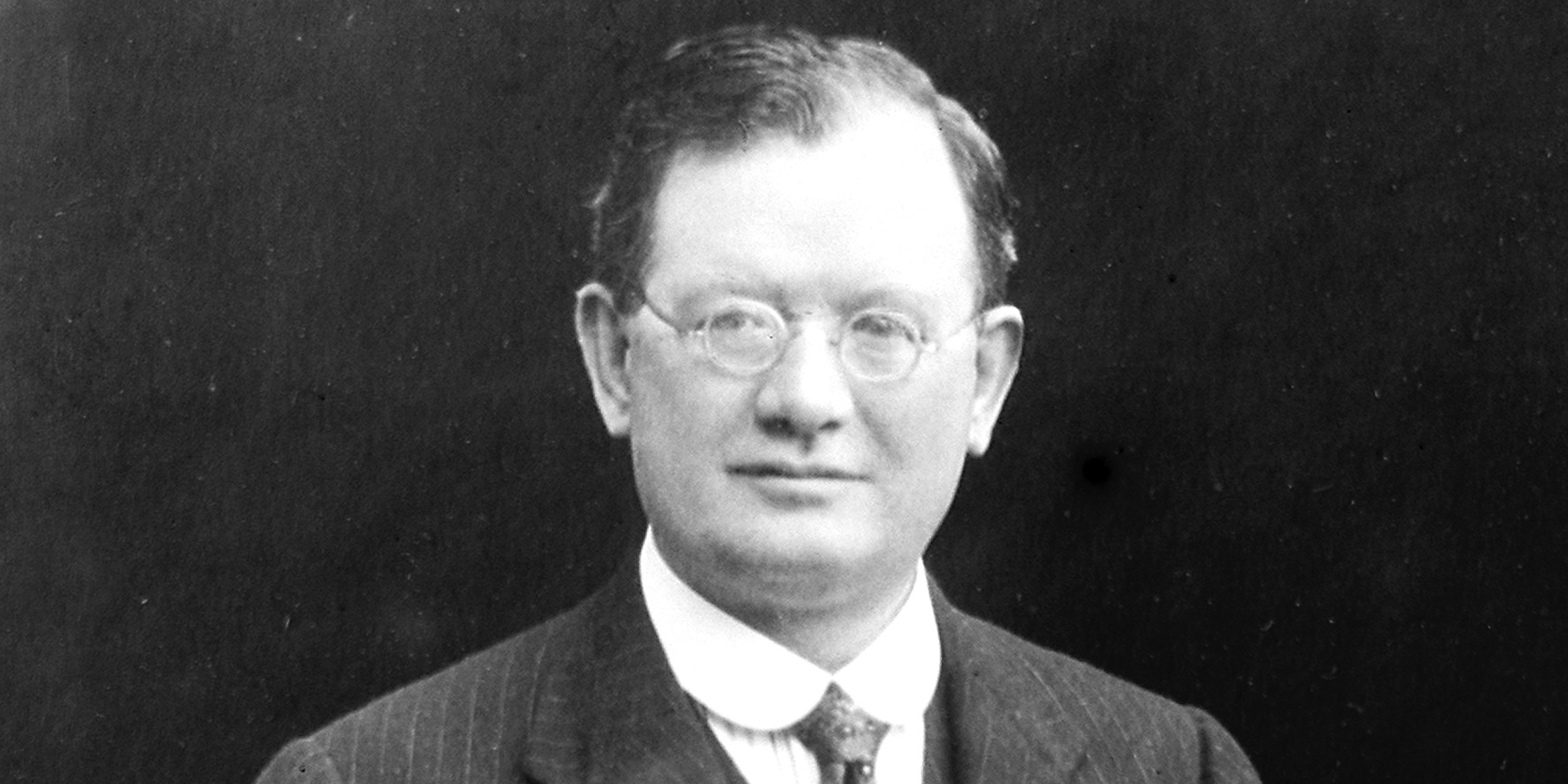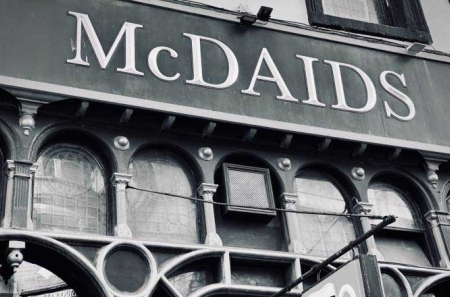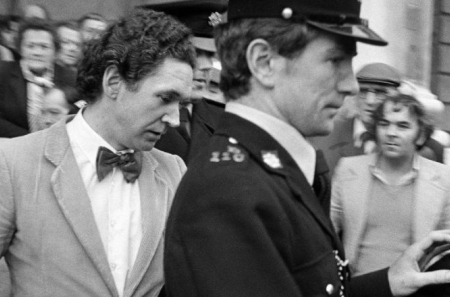
Karl Marx and the DIB: John Wheatley
08 May 201819 May is the 149th anniversary of the birth of John Wheatley (1869–1930), a Co. Waterford native and childhood emigrant to Scotland
A miner turned publisher and socialist polemicist and politician, Wheatley emerged from the ideological ferment of Glasgow’s ‘red Clydeside’ to become minister for health in the first, short-lived British Labour government of 1924.
Read the DIB entry on Wheatley, by Lawrence William White, below:
Wheatley, John (1869–1930), socialist and publisher, was born 19 May 1869 at Bunmahon, Co. Waterford, eldest among three sons and seven daughters of Thomas Wheately, copper miner of Welsh extraction, and Johanna Wheately (née Ryan); it is not known when he came to use the spelling ‘Wheatley’. The family emigrated (late 1870s) to a one-room miner's cottage without drainage or indoor plumbing in Braehead (now Bargeddie), Lanarkshire, Scotland, where his father worked in a coal pit. After attending St Bridget's Roman Catholic parish school, Baillieston, till age 11, Wheatley worked thirteen years as a miner (1880–93). An omnivorous reader, he attended evening classes at the Glasgow Athenaeum, walking the ten-mile (16 km) return distance. After working as a publican in Braehead (1893–6) and as assistant in shops owned by his brother in Shettleston and Glasgow (1896–1901), he was employed by the Glasgow Observer (1901–6), the leading catholic newspaper in western Scotland, briefly as reporter, then as advertisement canvasser. With a newspaper colleague he established the printing-and-publishing firm of Hoxton & Walsh; specialising in shopkeepers' advertisement calendars and religious prints, the business prospered, becoming a limited company in 1911. Expanding further into church publishing, by the time Wheatley bought out his partner (1918) he had secured moderate wealth, and soon purchased a substantial residence in Glasgow's Sandyhills district.
Active from his youth in the United Irish League (he was president of the Shettleston branch (1901–3) and delegate to the 1903 British convention), through his close study of catholic social teaching Wheatley moved inexorably towards socialism. Co-founder of the Catholic Socialist Society (1906), he exhibited considerable skills as publicist, propagandist, and prolific pamphleteer. Overcoming ideological hostility from catholic clergy and laity, and opposition from Irish nationalists fearful of splitting the Irish vote in Scotland to the detriment of the Liberal alliance, the society in time contributed substantially to the critical movement of Irish and catholic voters towards support for the Labour Party. Expounding in debate and polemic the validity of Christian socialism against such adherents of Marxist materialism as John Maclean, Wheatley remained to his death a devout catholic. His ever widening circle of socialist friends included James Connolly (qv), a profound influence on his thinking and frequent visitor in his home. Joining the Independent Labour Party (ILP) in 1907, Wheatley succeeded by two votes in his second attempt to be elected to Lanarkshire county council (1910–12). After incorporation of his Shettleston constituency into Glasgow city, he was elected by a substantial majority to the corporation (1912–22), and soon emerged as the dominant figure in the Glasgow Central Labour Party, a coalition of the local ILP, trades council, and Fabian society. Developing a keen expertise in local government matters, with especial interest in health and housing, he devised a scheme for rehousing tenement dwellers by allocating funds from the city's profitable tram system to construction of municipal cottages at £8 rent per annum – a practical expression of his evolving ideology of decentralised municipal socialism. A vociferous opponent of the first world war, he was active in anti-conscription agitations. His prominence in the 1915 Glasgow rent strike, which originated in protests against the eviction in his ward of the family of a serving and wounded soldier, greatly enhanced his constituency support base. He condemned the executions of the leaders of the 1916 Irish rising, despite having moved to a conviction that Irish independence was of marginal relevance to either Irish or British working-class interests. Though disapproving tactics of the shop-steward revolutionists of the Clyde Workers' Committee – he drafted a 1916 dilution-of-labour scheme that defused their agitation – he arranged legal defence for militants jailed or deported both during the war and after the 1919 Glasgow general strike. Leader of the Labour group on Glasgow corporation that increased its representation in the 1920 local elections (though falling short of a majority), he was the dominant figure in the post-war Labour upsurge in western Scotland. Defeated by a mere seventy-two votes in Glasgow Shettleston in the 1918 parliamentary election, he was among the ten Labour MPs returned in the fifteen Glasgow constituencies in the breakthrough 1922 election.
After lending vital support to James Ramsay MacDonald's selection as party leader, Wheatley was elected to the parliamentary party executive. He was one of three Clydeside MPs suspended with James Maxton for repeating the latter's condemnation of child-welfare cuts as ‘murder’ in a turbulent house-of-commons fracas (29 June 1923). He launched a newspaper, the Glasgow Eastern Standard (which circulated 1923–60), a forum for the views of the Clydeside Labour group. As Labour spokesman on housing he won repute as a formidable debater, noted (despite his small, squeaky voice) for closely argued speeches and mastery of detail. Minister for health in the first Labour government (January–October 1924), he drafted and deftly carried through the commons a complex housing act, the short-lived minority government's only significant legislative achievement. Providing subsidies to local authorities that stimulated considerable council-house building, the act, to Wheatley's disappointment, benefited only those of the working class who could afford the rents. A companion bill to control building-materials prices was pending when the government fell. Wheatley rebuffed representations to his ministry to allow birth-control advice to be given by public health officers. Frustrated by compromises with principle while holding office, he returned to opposition pledging a ‘return to a fighting policy’. His concerted efforts to move the Labour Party to more militantly socialist policies made little impact, but prompted a widening rift with the party leadership. Failing to win reelection to the party executive (December 1925), he was prominent in a left-wing takeover of the ILP – a constituent grouping within the Labour Party – of which he had been a national administrative councillor since 1924. Withdrawing dramatically to the Labour backbenches (March 1927), he manoeuvred to lead a leftist putsch against MacDonald, but overestimated the depth of radical purpose within his ILP base. He opposed formation of the second minority Labour government (1929), and was severely critical of ministers and policies (notably the national insurance bill) that he regarded as excessively moderate. Espousing ever more radical objectives, he remained committed to constitutional politics as the means to achieve them.
Wheatley married (1896) Mary Meechan (various spellings) of Baillieston, daughter of an Irish-born railway ganger. Their one son and one daughter both received university educations and practised professional careers. Beginning with his time in ministerial office Wheatley's health suffered a steady decline under the stresses of public life. He died suddenly in his Sandyhills home of a cerebral haemorrhage on 12 May 1930.
Wheatley's character and achievements were many-sided and paradoxical. A self-educated worker, he became both an adept at theoretical disputation and a master of the detail of topical issues. His command of theoretical economics was exceptional for a politician of any persuasion. Radically socialist in conviction, he was a self-made businessman, a constitutional democrat, and an able, efficient government minister. Lacking the charisma of certain of his radical Clydeside colleagues, he commanded greater respect and confidence as a dependable leader. Rotund in physique, amiable in expression, bespectacled, sartorially fastidious, he contrasted amusingly on manifold shared platforms with the lanky, gaunt, dishevelled Maxton, his closest political friend, ally, and heir.
GRO (birth cert.); DNB; WWW; G. D. H. Cole, A history of the Labour Party from 1914 (1948); Keith Middlemas, The Clydesiders: a left wing struggle for parliamentary power (1965) (portrait photo opposite 193); Joyce M. Bellamy and John Saville (ed.), Dictionary of labour biography (1976); William Knox (ed.), Scottish labour leaders 1918–39: a biographical dictionary (1984); Henry Pelling, A short history of the Labour Party (1985 ed.)
Follow the DIB on Twitter @DIB_RIA – where we post topical biographies.
All 10,423 biographies are available at: dib.cambridge.org
Image, via Wikimedia Commons, courtesy of Wellcome Images: Attribution 4.0 International (CC BY 4.0)



